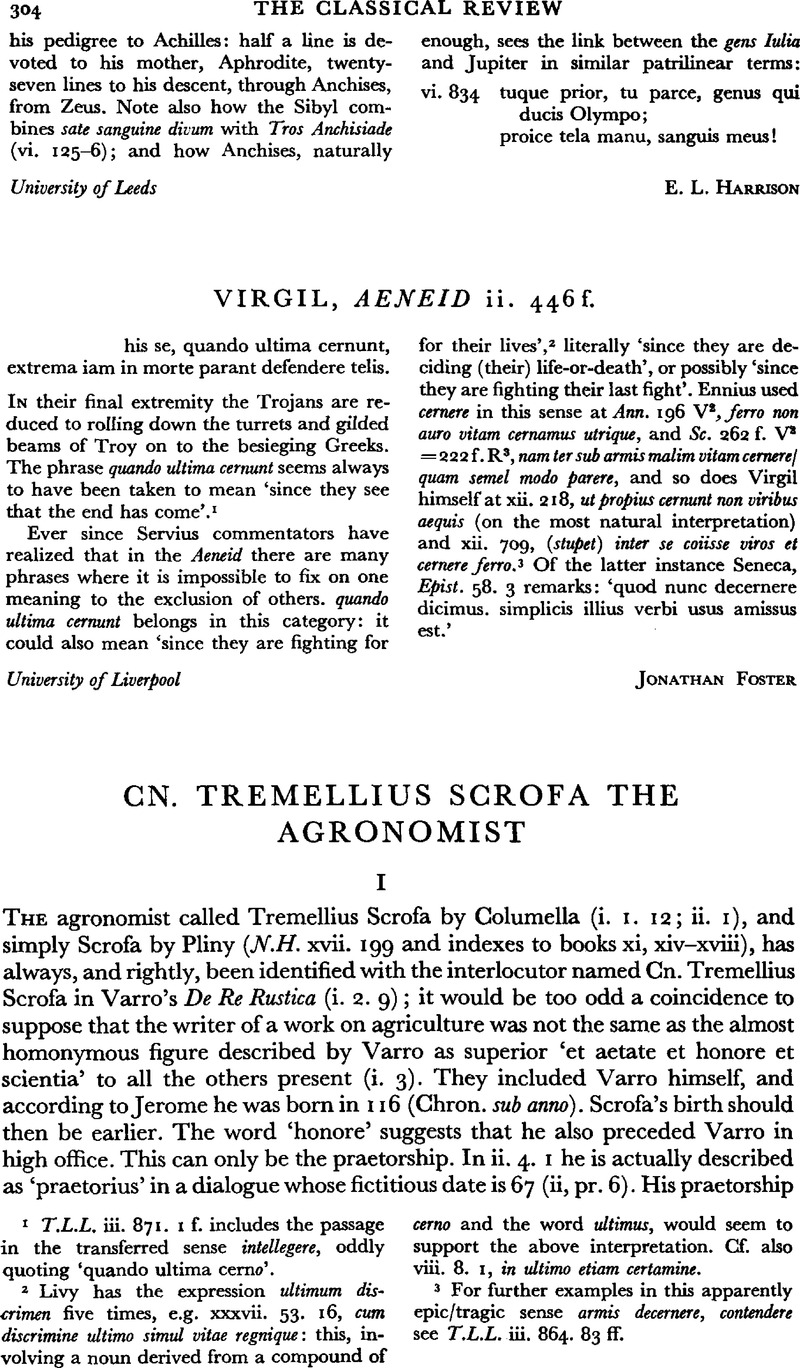Article contents
Cn. Tremellius Scrofa the Agronomist
Published online by Cambridge University Press: 27 February 2009
Abstract

- Type
- Review Article
- Information
- Copyright
- Copyright © The Classical Association 1972
References
page 305 note 1 M.R.R. 466, 473. It is known from Gell. xiii. 12. 6 that Varro was tribune of the plebs; Cichorius, R. St. 202 f., argued that he would not have held this office (a) in the Marian regime nor (i) between 82 and 75, Transalwhen the ex-tribunes were debarred from holding further offices, nor (c) between 76 and 71, when he was with Pompey in Spain; but (a) and (c) are not cogent. Fixing the tribunate in 70, Cichorius (cf. Dahlmann, R.E. Suppl. vi. 1176) put his praetorship in 68 antecedent to his being legate of Pompey in 67: that implies that he had not taken a province in the year after his praetorship, which would be odd in a man who (unlike Cicero) had no aversion to provincial posts. There is no ground for supposing that he must have been praetor before 67. The best way of fixing his praetorship within limits is by inference from the most probable date for Scrofa's.
page 305 note 2 See my Italian Manpower, 465; M. Lepidus plainly did not go out to Transal pina in 77, but Mam. Lepidus, cos. 77, may have held the province from 77 to 75 (cf. Balsdon, J. P. V. D., J.R.S. 1939, 57 ff.Google Scholar for consuls as provincial governors) and L. Afranius may have triumphed thence in 69, having been governor in 70.
page 305 note 3 R.E. vi A 2. 2287 ff. Münzer also thought of Macedonia, but see Shackleton Bailey on Att. vi. 1. 13; vii. r. 8.
page 305 note 4 Martin, R., Recherches sur Us agronomes latins (1971), 237 ff.Google Scholar
page 305 note 5 Ibid. 227 f.
page 306 note 1 M.R.R. ii. 198 f., where the queries seem to me unjustified.
page 306 note 2 For parallels see Italian Manpower, 79 f.
page 306 note 3 Ibid. 463 ff.
page 306 note 4 Jullian, C., Hist, de la Gaule, iii. 107 ff.Google Scholar
page 307 note 1 Though I differ from Martin on some points and have added further arguments to his case, it is due to him that the two Scrofas have been distinguished.
page 307 note 2 Despite, Fam. ix. 8. 1Google Scholar (‘coniunctionem studiorum’) and the philosophic allusions of ix. 4 and 7. 2. On their relations see Tyrrell, and Purser, , Correspondence of Cicero, iv, lxvi ff.; v, p. xix n. 3.Google Scholar
page 308 note 1 Cf ‘Murrius’ in ii. 6. 2, 8. 3 and ‘Stolo’ in i. 14. 4; Reate was Varro's birthplace where he had a villa and herds (ii, pr. 6; iii. 1. 6, 2. 15); he also introduces a neigh-bouring proprietor, Axius, iii. 2 passim.Scrofa is also made to refer to Reatine conditions in i. 7. 7, 8. 7.
page 308 note 2 Livy xlv. 25. 2; cf. Sail. Cat. 31. 6. The shorthand version of Cato's speech of 5 Dec. 63 (Plut. Cato Minor 23) was not a literary production and did not therefore deter Sallust from giving a free version of what Cato said.
- 1
- Cited by


